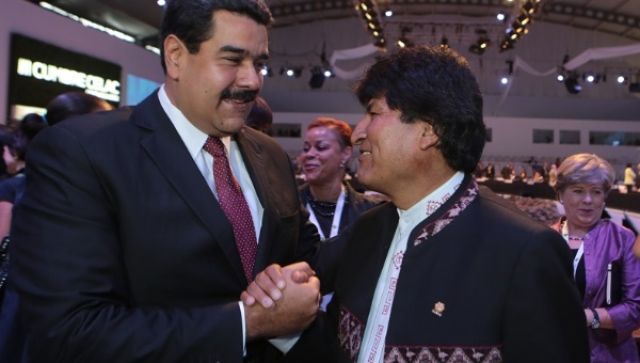
The US’s role in Latin America is facing a growing challenge. The 33 member states of the Community of Latin American and Caribbean States (CELAC) vehemently rejected North American intervention in the continent, and particularly the US-led blockade of Cuba and recent sanctions against Venezuela.
These positions were part of the “Belen Declaration”, approved during CELAC’s third annual presidential summit, held on January 28th and 29th in Belen, Costa Rica.
Formed in 2011, CELAC is a political initiative proposed by former Venezuelan president Hugo Chavez, who aimed to revive Simon Bolivar’s dream of a united Latin American continent.
The 22-page declaration read: “We reiterate our most profound rejection of the implementation of all coercive and unilateral measures and once more call on the US to end the economic, commercial and financial blockade which it has imposed on its sister nation for over five decades.”
The declaration includes 94 different points and is characterised by an emphasis on regional cooperation, social inclusion, sovereignty and right to self determination of member states. It is also committed to tackling poverty and inequality.
Other points of action include an effort to generate sustainable models of production and consumption, the promotion of regional energy integration and to build bilateral ties with other regional groups and particularly with the BRICS (Brazil, Russia, India, China and South Africa), the African Union and the League of Arab States.
The declaration also cites “South-South” cooperation as vital for regional development.
Nicolas Maduro, Chavez’s successor as Venezuelan president, said: “We came with the spirit of the Liberator, Simon Bolivar’s men and children, we came with his flag, the flag of unity.”
Maduro hailed the document as a “historic” declaration that represents a transcendental moment in the continent’s independence.
“The Liberator foresaw the centuries that lay ahead and he sought the time to bring about unity between us,” the Venezuelan leader said. “He said that this time had to be demarcated through legal mechanisms and 200 years later, it has fallen on this generation to carry this through.”
CELAC represents the first time that the 33 countries in Latin America and the Caribbean have been united in a regional group without the presence of the US and Canada.
It brings together governments from differing, and even conflicting, ideological orientations, including the right-wing governments of Mexico and Colombia and the socialist administrations of Venezuela and Bolivia.
“Beyond ideological borders and the politics that separate us, there is a diverse America,” Maduro said. “[CELAC’s strength] is to have achieved unity in diversity, based on respect, solidarity and helping each other in the joint construction of Latin America and the Caribbean.”
During the summit, the temporary presidency of the group was officially passed from Costa Rica to Ecuadorian President Rafael Correa. He applauded Venezuela’s and Nicaragua’s initiative to have US colony Puerto Rico occupy a seat at CELAC’s next summit. He said the action would “demonstrate that America is a region free of colonialism”.
Correa said: “CELAC must play a protagonistic role in accompanying the process of decolonisation in the Latin American and Caribbean region.
“In general, it should be the ‘go to’ organisation for the resolution of conflicts or long standing issues which affect the countries in the region.”
The Belen Document goes on to stress member states’ commitment to nuclear disarmament in Latin America and their support for the ongoing peace talks in Colombia aiming to end more than 50 years of civil war.
It also expressed solidarity with the initiative of the Caribbean Community and Common Market (CARICOM) to form a reparations commission for Caribbean countries affected by slavery and Argentina’s fight against the vulture funds.
With the exception of the French Caribbean islands, the US has directly and indirectly intervened in or occupied all Latin American and Caribbean countries since the early 19th century.
Recent examples include support for attempted coups against the leftist governments of Venezuela (2002), Bolivia (2008) and Ecuador (2010), as well as successful coups against Manuel Zelaya in Honduras in 2009 and Paraguay’s Fernando Lugo in 2012.
Maduro said: “We are in the era of our America, of our Latin-Caribbean America. After 200 years searching for our path, we have found it.”
[Reprinted from Venezuela Analysis.]
Like the article? Subscribe to Green Left now! You can also like us on Facebook and follow us on Twitter.